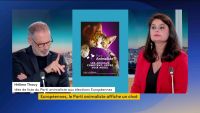Accueil
AnimalZooFrance : Mais où est ce que je viens de tomber ?!
Vous êtes ici sur un site d'information dédié à la zoophilie et au monde de la protection animale.
Concernant la zoophilie, ce site n'héberge aucun contenu explicite. Je considère la zoophilie comme étant une orientation sexuelle, et entend défendre certaines pratiques. Vous trouverez également des informations sur la loi courante sur la zoophilie en France, de la littérature sur le sujet.
Concernant la protection animale, il s'agit d'une veille sur les associations de protection animale, qui derrière un message de défense des animaux, ne sont en réalité là que pour se faire de l'argent, avec des demandes de dons incessants et des responsables salariés, payés par ces même dons.
Actualité du Ziki
25 Décembre 2024
Joyeux Noel à toutes et à tous !
J'espère que vous avez passez un bon Réveillon, et même si vous n'avez pas eu le cadeau que vous souhaitiez, ne cessez jamais à croire à vos rêves !
27 Juillet 2024 - Taboo Science
Taboo Science est un podcast américain sur "les choses dont on n'ose pas parler" aborde dans son numéro de juin dernier le sujet de la zoophilie.
Nous avons traduit les sous titres en français afin de faciliter sa compréhension.
Il s'agit d'un résumé d'une étude conduite sur le forum américain ZooVille, et on y apprend une notion très intéressante d'une échelle à plusieurs axes pour décrire la zoophilie.
On y retrouve le cast du podcast américain Zooiter Than Thou.
23 Juin 2024 - Serveur Discord
Je tente l'installation d'un serveur Discord. Pour ceux qui ne savent pas c'est quoi, c'est un endroit qui permet de discuter avec d'autres personnes. C'est la même chose qu'un groupe WhatsApp, qu'un groupe Messenger, qu'un groupe Télégram.
De toutes les solutions de communication qui existent, j'ai préféré Discord. Chacune a ses inconvénients et avantages, mais Discord me semble le plus "sûr".
29 Mai 2024 - Hélène Thouy aux européennes
Pour Hélène Thouy, l'affiche de campagne de son parti politique n'est pas de l'exploitation animale, et la photo est une photo tout ce qu'il y a de naturel.
- "Vous avez imposé une séance photo à un chat qui ne vous avez strictement rien demandé..."'
- "Non, ce n'est pas du tout imposé, c'est une photo comme vous pouvez prendre votre chat en photo".
C'est aussi ça le biais cognitif (ou plutôt l'escrologie ...)
3 Avril 2024 - Prison ferme pour un zoophile
Pour la première fois de notre histoire, un zoophile a été condamné à de la prison ferme.
Il a été jugé pour des rapports sexuels avec une chienne et un chien. Aucune violence n'a été relevée. 8 associations de protection animale étaient partie civile, pour une audience de 8 heures. Du jamais vu.
12 Mars 2024 - Rapport de situation en France
Un excellent rapport sur la nouvelle loi a été publiée sur le site allemand ZetaVerein (l'article est en français).
N'hésitez pas à aller le consulter, c'est un rapport d'une très grande qualité, qui relativise la situation actuellement et fait prendre conscience de la loi actuelle.
Accéder au rapport (VF - PDF)
Accéder à la page sur Zeta-Verein (VF)
Accéder à l'article sur AnimalZooFrance (backup)
8 septembre 2023
C'est une bande dessinée publiée par l'influenceuse "Insolente Veggie" qui nous intéresse en cette rentrée 2023 !
Elle ose démonter le fait que la nouvelle loi qui interdit la zoophilie, n'est pas faite pour protéger les animaux, mais bel et bien la morale.
Accéder à l'article
Dans le même temps, c'est la même idée qui s'est propagée sur Twitter, où un utilisateur a vu son compte bloqué après avoir voulu mettre en évidence la stupidité de cette loi. Vous pouvez retrouver son témoignage sur cet article.
Derniers articles du blog
8 Avril 2025 - AnimalCross recherche un pigeon, de l'IA sur AnimalZooFrance, PAZ qui se mange un revers de la mairie de Paris 4 Avril 2025 - Avis de recherche + PAZ, association terroriste et fière de l'être. 7 Février 2025 - Animal Cross ne manque pas de cynisme + nouveaux articles sur la PA 20 Septembre 2024 - Mais où est la zoophilie à Mazan ?! 5 Septembre 2024 - Benoit Thomé relaxé après avoir diffusé les coordonnées d'un zoophile présumé / Sa plainte pour zoophilie classée sans suite 27 Juillet 2024 - Taboo Science / Homosexualité & Zoophilie / Question intéressante
Lumière sur...
Lutte contre la zoophilie : Morale ou Protection animale ?
En 2020, Benoit Thomé, président de l'association Animal Cross, était parti en croisade contre la zoophilie.
Il disait ne pas être motivé par la défense de la morale, mais par la protection des animaux.
Cela fait 3 ans que la loi contre la zoophilie a été alourdie. Il est maintenant possible de faire un bilan sur la question de savoir si cette loi vient défendre les animaux ou la morale.
Accéder à l'article.
Modification de la loi

La loi en France sur la zoophilie a changé fin 2021.
Elle a été définitivement adoptée par le Parlement, et a été promulgée fin novembre 2021.
Les animaux sont maintenant considérés comme des enfants : toute forme de contact sexuel est interdit, l'animal étant considéré comme incapable de donner son consentement.
N'hésitez pas à consulter la page sur la loi courante pour plus de détails.
PROPRIÉTAIRES D'ANIMAUX : apprenez les bons gestes avant qu'il ne soit trop tard !

Depuis Novembre 2021, la zoophilie est un délit, puni de 4 ans de prison et 60 000 € d'amende.
Il faut maintenant que chacun prenne les réflexes afin de garantir sa sécurité, celle de ses animaux et des personnes avec lesquelles elle est en contact. Par exemple :
- Que faire si la police débarque à 6h du matin à votre domicile ?
- Quelles précautions à prendre pour éviter que vos animaux ne soient saisis ?
- Comment protéger le contenu de votre ordinateur ?
N'attendez pas qu'il soit trop tard, ne pensez pas que cela n'arrive qu'aux autres. Découvrez toutes les étapes clefs d'une enquête de justice, de l'ouverture de l'enquête préliminaire au jugement final.
En plus, cela pourrait vous êtes utile dans bon nombre de situations qui n'a rien à voir avec la zoophilie !
A propos du Ziki...
Nous essayons autant que possible de regrouper ici tout ce qui concerne la zoophilie. Le sujet est abordé aussi bien d’un point de vue culturel que pratique. Cette encyclopédie libre s'adresse :
- aux zoophiles qui y trouveront des informations pratiques sur ce que l'on peut faire et ne pas faire;
- aux non zoophiles désirant en savoir un peu plus sur un sujet qui reste largement tabou et méconnu;
- aux anti-zoophiles s'ils le souhaitent;
- aux défenseurs de la cause animale en général.
Avant la visite, sachez:
- que ce site ne fait aucun prosélytisme de la zoophilie ni ne l'encourage sous aucune forme. Mon premier conseil pour les curieux c'est : "si vous pouvez vous en passez, passez vous en, c'est plus un fardeau qu'une bénédiction d'être zoophile".
- que vous ne trouverez ici aucune photographie pornographique. Tout au plus, vous trouverez dans la partie pratique des images de sexe d'animaux dans un but informatif, et des extraits de romans datant du XIXe et XXe siècle qui peuvent avoir un contenu explicite.
- que vous trouverez dans la Cause plusieurs pages militantes. Nous passons du temps pour défendre ce qui doit être défendu et condamner ce qui doit l'être. Ainsi nous sommes favorables à la légalisation d'une certaine forme de zoophilie, mais nous condamnons un grand nombre de pratiques mettant en jeu l'Homme et l'Animal (pénétration d'un animal de petite taille, violence sur les animaux durant l'acte, etc)
Message à l'attention des défenseurs de la cause animale (ce que nous sommes également) : Une personne qui pénètre une poule, ou qui découpe les organes génitaux d'animaux, ou encore qui enferme une chienne et qui la maltraite, n'est PAS une personne zoophile et ces personnes là sont à condamner au titre de maltraitance et cruauté envers un animal.




